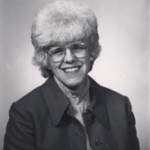Interviewer: Jennifer Faith, Lisa Prendergast and Keri Hevner
Interview Date: February 11, 2011
Location: Valley Library, Oregon State University
Duration: 1:45:37
Zoe Ann Holmes was born and raised in southeast Kansas in a small college town. She was the middle of five children and she talks extensively about her siblings and other immediate family. Her early interest in science was pushed by her father and eventually led to her studying to be a food scientist. She stayed at home while going to college at Kansas State for her Bachelor’s and Master’s degrees. Holmes notes that she was also one of KSU’s first graduates to earn a minor in Baking Technology.
Holmes next describes her tenure at Oregon State University and how, after four years of teaching Nutrition and Food Management, she decided to get a Ph.D at the University of Tennessee. She broadly describes her projects involving turkey, lamb, apples and potatoes, and discusses a project on the pre-rigor pressurization of meat. She also touches upon a different project in which she and her colleagues tried to solve the “sugar end” problem, a growth epidemic plaguing potato farms in Oregon, Washington and Idaho. Holmes adds that there were no women in her field, nor were there women in most science departments at UT.
From there, Holmes discusses her interactions with technology while at Oregon State in the 1970s, making mention of a large research project involving simulated laboratory experiments in foods. She also describes how she started a committee at OSU to create a computer lab that was accessible for everybody, not just the Computer Science and Business departments. She then talks about how she was the first teacher to use the Blackboard software suite at Oregon State and that she helped other teachers install and set up the program in their offices on campus.
Near the conclusion of the interview, Holmes touches on other achievements, ranging from her development of a website called “The Food Resource” to becoming Faculty Senate President. She likewise discusses her passion for teaching and recalls specific students that she has helped over the years, including a particularly memorable international student who assisted Holmes in becoming a Senior Consultant at the Nutritional Research and Developmental Center in Bogor, Indonesia.
Dublin Core
Title
Description
Holmes next describes her tenure at Oregon State University and how, after four years of teaching Nutrition and Food Management, she decided to get a Ph.D at the University of Tennessee. She broadly describes her projects involving turkey, lamb, apples and potatoes, and discusses a project on the pre-rigor pressurization of meat. She also touches upon a different project in which she and her colleagues tried to solve the “sugar end” problem, a growth epidemic plaguing potato farms in Oregon, Washington and Idaho. Holmes adds that there were no women in her field, nor were there women in most science departments at UT.
From there, Holmes discusses her interactions with technology while at Oregon State in the 1970s, making mention of a large research project involving simulated laboratory experiments in foods. She also describes how she started a committee at OSU to create a computer lab that was accessible for everybody, not just the Computer Science and Business departments. She then talks about how she was the first teacher to use the Blackboard software suite at Oregon State and that she helped other teachers install and set up the program in their offices on campus.
Near the conclusion of the interview, Holmes touches on other achievements, ranging from her development of a website called “The Food Resource” to becoming Faculty Senate President. She likewise discusses her passion for teaching and recalls specific students that she has helped over the years, including a particularly memorable international student who assisted Holmes in becoming a Senior Consultant at the Nutritional Research and Developmental Center in Bogor, Indonesia.

